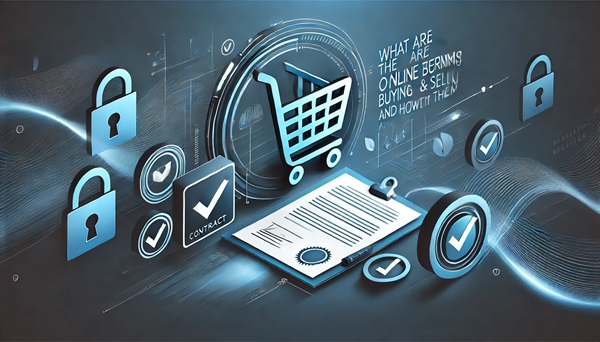The rise of e-commerce has revolutionized how we conduct business, with an increasing number of transactions happening online. As businesses and consumers shift towards digital platforms, understanding the legal and practical implications of online buying and selling has never been more important. This article explores what are the terms of online buying and selling and how to comply with them in detail, covering everything from legal regulations to consumer protection and business obligations. By the end of this guide, both buyers and sellers will have a comprehensive understanding of these terms and how to stay compliant.
Companies like Linkysoft provide innovative e-commerce systems that streamline compliance with online buying and selling terms, making it easier for businesses to navigate this complex landscape. These systems help manage legal requirements, payment methods, and shipping processes, ensuring both compliance and efficiency in day-to-day operations.

Section 1: The Legal Framework for Online Transactions
Understanding Consumer Protection Laws
Consumer protection laws are the foundation of the terms governing online transactions. These laws are designed to protect buyers from fraud, misrepresentation, and unfair practices, ensuring that sellers adhere to certain standards. Although these laws vary across regions, their core objective remains the same: to foster trust and fairness in online transactions.
Key Consumer Protection Laws Across Different Regions
In the U.S., the Federal Trade Commission (FTC) ensures fair and transparent business practices. Sellers must adhere to rules concerning advertising, product descriptions, and refund policies. In the European Union, the Consumer Rights Directive provides similar protections, including a mandatory 14-day return period for most products purchased online.
Compliance Strategies for Sellers
Sellers must be diligent in understanding and complying with local consumer protection laws. This includes being transparent about product details, shipping policies, and return processes. Failure to comply can lead to penalties, legal disputes, or damaged reputation. By using systems like Togar, sellers can streamline compliance by automating much of the legal documentation required to meet these standards.
Section 2: Crafting Clear Terms of Service (ToS)
What Are Terms of Service?
Terms of Service (ToS) are the contract between a buyer and seller that outline the rights and responsibilities of both parties. This agreement is essential for ensuring that both sides understand the rules of engagement when conducting online transactions. The ToS typically cover topics like payment methods, product delivery, warranties, and dispute resolution.
How to Draft an Effective ToS
Creating a clear and comprehensive ToS is essential for building trust with customers and protecting your business. When drafting a ToS, it's important to ensure that the terms are easy to understand while still being legally enforceable. Common elements to include are shipping timelines, return policies, and procedures for resolving disputes. Systems like Togar offer customizable templates to help e-commerce businesses develop terms that meet regional legal requirements.
Why Buyers Should Always Read the ToS
Many buyers skip reading the ToS, often to their detriment. The ToS lays out crucial information about what customers can expect from the transaction, such as shipping times, returns, and potential fees. Buyers who understand the ToS are better equipped to handle any issues that might arise during the transaction process.
Section 3: Privacy Policies and Data Security
The Role of Privacy in E-commerce
With personal data being a fundamental part of online transactions, privacy policies are crucial for any e-commerce business. Consumers need to trust that their personal information, such as payment details and shipping addresses, will be kept secure. A clear privacy policy outlines how data is collected, used, and protected by the business.
GDPR and Global Privacy Laws
In recent years, regulations like the General Data Protection Regulation (GDPR) in Europe have significantly tightened the requirements for data protection. The GDPR requires businesses to be transparent about how they collect and process customer data. Non-compliance can result in hefty fines. In the U.S., similar laws, such as the California Consumer Privacy Act (CCPA), offer consumers protection over how their data is handled.
Ensuring Compliance with Data Privacy Laws
Sellers must ensure they comply with data privacy regulations by using secure e-commerce platforms that prioritize data encryption and user consent. Solutions like Linkysoft’s e-commerce systems help businesses stay compliant by integrating robust security features and privacy policies that align with global standards.
Section 4: Payment Methods and Secure Transactions
Accepted Payment Methods in E-commerce
The variety of payment methods available in online transactions has grown substantially in recent years. From credit cards and bank transfers to digital wallets and cryptocurrencies, each payment method comes with its own set of regulations and security concerns. It is essential for businesses to offer a range of payment options to cater to customer preferences while ensuring secure and compliant transactions.
Compliance with PCI DSS for Credit Card Transactions
For businesses that handle credit card payments, adhering to the Payment Card Industry Data Security Standard (PCI DSS) is non-negotiable. This set of security standards is designed to protect cardholder data by ensuring secure data storage and transmission. Compliance with PCI DSS not only protects customers but also prevents costly data breaches and legal consequences for businesses.
How E-commerce Systems Ensure Secure Payments
E-commerce platforms like Cartz help businesses manage secure payment gateways and implement the necessary security measures to comply with industry standards. This includes encryption technologies, fraud detection tools, and seamless integration with third-party payment providers.
Section 5: Accurate Product Descriptions and Truthful Advertising
The Legal Implications of Misleading Advertising
Truth in advertising is a fundamental part of consumer protection laws. When selling products online, businesses must ensure that product descriptions, images, and any claims made about the product are accurate and not misleading. False advertising can result in legal penalties and damage to the business's reputation.
Global Advertising Standards
Different regions have their own advertising regulations. In the U.S., the Federal Trade Commission (FTC) enforces rules about truthful advertising. Sellers must back up any claims made about their products, especially if those claims pertain to health, safety, or performance. Similarly, in the EU, businesses must adhere to the Unfair Commercial Practices Directive, which prohibits misleading advertising.
How to Ensure Accurate Product Listings
Sellers should regularly review their product descriptions to ensure accuracy. Using an e-commerce platform like Cartz helps automate this process by allowing businesses to easily update listings and ensure consistency across all channels.
Section 6: Shipping and Delivery: Setting Expectations
Why Clear Shipping Policies Are Essential
Shipping and delivery are crucial components of the e-commerce experience. Sellers must provide clear and concise shipping policies to set realistic expectations for delivery times, costs, and responsibilities in case of lost or damaged goods. This transparency is key to building trust and ensuring customer satisfaction.
Legal Requirements for Shipping Policies
In some regions, there are legal requirements regarding shipping terms. For example, in the EU, sellers must provide consumers with an estimated delivery time and notify them of any delays. In the U.S., businesses must comply with the FTC's Mail or Telephone Order Merchandise Rule, which requires sellers to ship products within the time frame stated during the sale or within 30 days if no time frame is provided.
Automating Shipping with E-commerce Platforms
Platforms like Togar offer tools to automate shipping management, helping businesses provide accurate tracking information, calculate shipping costs, and communicate delivery times effectively to customers.
Section 7: Return, Refund, and Cancellation Policies
The Importance of Transparent Return and Refund Policies
Returns and refunds are often a source of friction between buyers and sellers in e-commerce. Having a clear and fair return policy can help alleviate customer concerns and improve the overall shopping experience. These policies should outline the conditions under which returns or refunds are accepted and the timeline for processing them.
Consumer Rights and Legal Obligations for Returns
In many regions, consumers have the right to return products within a certain timeframe. In the EU, the Consumer Contracts Regulations allow customers to return products within 14 days for a full refund, no questions asked. In the U.S., return policies are more flexible but must be clearly stated and honored by the seller.
Managing Returns with E-commerce Systems
Using an e-commerce platform like Togar Pro helps businesses streamline the return process, ensuring that customers receive return labels, refunds are processed promptly, and any disputes are handled efficiently.
Section 8: Handling Disputes and Implementing Dispute Resolution Mechanisms
Common Disputes in Online Transactions
Disputes in e-commerce often arise from product quality issues, shipping delays, or billing errors. Handling these disputes in a timely and professional manner is essential for maintaining customer trust and avoiding negative reviews or legal challenges. Having a clear dispute resolution process in place helps resolve issues quickly and fairly.
Arbitration and Mediation in E-commerce
Many businesses opt for arbitration or mediation as methods of resolving disputes outside of court. In some cases, consumers can use platforms like the EU's Online Dispute Resolution (ODR) portal to resolve disputes without legal intervention. This can save time and money for both parties involved.
Using E-commerce Systems to Manage Disputes
E-commerce platforms like Cartz include tools for managing disputes, such as communication portals for customers to report issues and automated workflows for tracking resolutions.
Section 9: Maintaining Compliance in an Evolving E-commerce Landscape
The Future of E-commerce Compliance
As e-commerce continues to evolve, so do the regulations and standards that govern online transactions. Emerging trends such as digital currencies, decentralized marketplaces, and AI-driven customer service introduce new challenges for compliance. Businesses must stay informed about these changes and adapt their practices to remain compliant.
The Role of E-commerce Management Systems in Ensuring Compliance
To keep up with the ever-changing regulatory environment, businesses can rely on advanced e-commerce management systems like those offered by Linkysoft. These systems are designed to help sellers manage everything from payment security and privacy to dispute resolution and returns, ensuring compliance at every stage of the transaction process.
Conclusion: Staying Ahead in E-commerce
Understanding what are the terms of online buying and selling and how to comply with them is critical for success in the modern e-commerce environment. By staying informed about the legal landscape and utilizing tools like Linkysoft's e-commerce systems, businesses can operate more efficiently, avoid legal pitfalls, and build stronger relationships with their customers.








